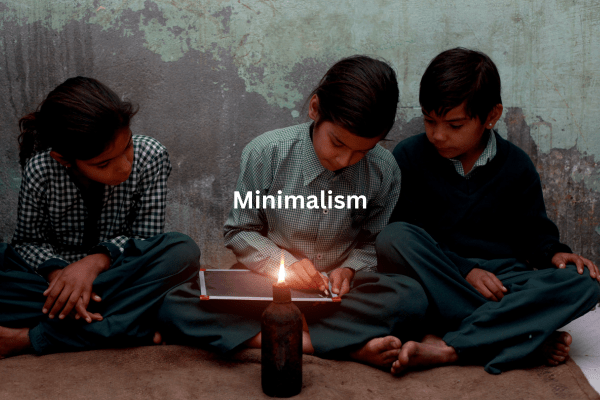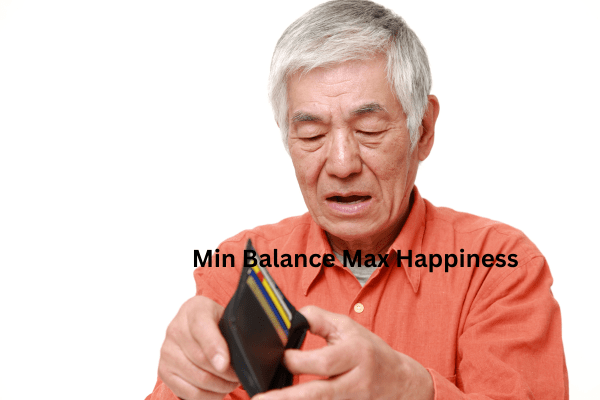Table of Contents
A SHORT AUDIO OF THE POST
Introduction
In a world driven by consumerism, the minimalist lifestyle stands as a powerful rebellion—an intentional choice to own less and live more. Minimalism is not just about having fewer things; it’s about making space—physically, mentally, and emotionally—for what truly matters.
But does having less really make us happier?
Research, psychology, and thousands of personal stories all support the idea that minimalism enhances happiness. In this blog post, we’ll dive deep into the connection between minimalism and happiness, explore its psychological benefits, look at real-life examples, and give you actionable tips to get started on your own minimalist journey.
What is Minimalism?
Minimalism is the deliberate promotion of what we value most and the removal of distractions.
It’s not about deprivation or living in an empty white space. Instead, it’s about choosing quality over quantity and creating space for what truly matters.
Minimalism in Different Aspects of Life:
Area of Life | Minimalist Approach |
Home | Decluttering, functional décor, no excess possessions |
Mindset | Letting go of mental noise and unnecessary worries |
Relationships | Prioritizing meaningful connections over many acquaintances |
Time | Being mindful of how you spend your day |
Finance | Avoiding debt, buying intentionally, saving more |
Work | Focusing on high-impact tasks, avoiding busy work |
How Owning Less Contributes to Happiness

Research shows disorganized environments raise stress markers but minimal living provides cognitive and emotional wellness to people. Here’s how:
1. Reduced Stress & Anxiety
Researchers from UCLA used tests to determine residential disorder’s impact on subject cortisol production rates.
A minimalist space enables people to gain both mental focus and emotional peacefulness.
2. More Financial Freedom
Budgeted money reserved from worthless purchases allows debt reduction along with financial expansion.
This budget system makes you value your memories instead of purchasing additional material possessions.
3. Improved Focus & Productivity
Technological data establishes that diminished environmental distractions enhance cognitive concentration (research from neuroscience evaluates this phenomenon).
An organized physical space creates positive influences on neural functions of the brain.
4. Stronger Relationships
People rank above things when individuals choose minimalistic living.
When people create meaningful shared activities together their relationships improve more strongly than when they purchase gifts individually.
Key Benefits of Owning Less
| Emotional Benefit | How Owning less Helps |
|---|---|
| Calmness | A clean, decluttered space reduces anxiety |
| Joy | Prioritizing what brings joy leads to fulfillment |
| Self-awareness | Less distraction = more clarity on what matters to you |
| Confidence | Owning your choices and needs leads to better self-esteem |
| Freedom from FOMO | Less comparison, more contentment |
Minimalism Is Not About:
❌ Living in an empty room
❌ Never buying new clothes
❌ Denying yourself pleasure
❌ Being extreme or rigid
Instead, You should ask purposeful questions which include:
Do I need this?
Does this particular item improve the value of my existence?
The reason I choose to maintain this consumption pattern is it due to feelings of guilt or based on my habits?
10 Practical Ways to Start Living with Less

If you’re ready to simplify, here’s a beginner-friendly roadmap:
✅ 1. Declutter One Area at a Time
Start small, your desk, one drawer or your bathroom counter. Do not attempt to achieve everything in a single day.
✅ 2. One in, one out. How should we adopt the “One In, One Out” rule?
With every thing you introduce to your world, introduce something else out of it.
✅ 3. Digital Minimalism
Set goal of unsubscribing from any unnecessary emails, cleaning your desktop, limiting screen time.
✅ 4. Minimize Your Wardrobe
Creating a capsule wardrobe is adopting a wardrobe of mix-and-match essentials that will make getting dressed easier and faster.
✅ 5. Shop With Purpose
Is this necessity? Well, are you trying to take the place of an emotional hole?
✅ 6. Simplify Your Calendar
Say no more often. Only accomplish meaningful things, not just busying yourself.
✅ 7. Use the 90/90 Rule
Would you consider it to be something you haven’t used in 90 days and you’re most likely not going to use it ever again within the next 90 days? Let it go.
✅ 8. Practice Gratitude Daily
Focus your mind away from the longing for more … to your already existing things. Simply counts down what you are grateful for everyday.
✅ 9. Meditate or Journal
Declutter your mind as well as your surroundings. Create inner stillness.
✅ 10. Adopt Experience Over Things
Travel on what you have, spend on hobbies and learning and not how much you can buy.

Minimalism and Happiness: What Science Says
Several studies confirm the connection between minimalism and happiness:
| Study / Source | Key Finding |
|---|---|
| Journal of Positive Psychology (2014) | People achieve higher life satisfaction through pursuing intrinsic goals of personal relationships and self-improvement instead of materialistic goals. |
| UCLA’s Center on Everyday Lives of Families | It was discovered that families who let clutter accumulate reveal higher cortisol levels in their bodies. |
| Journal of Consumer Research (2017) | People achieve longer happiness through experiences instead of material possessions. |
| Joshua Becker (Author of “The More of Less”) | He explains that minimalism allows people to experience both purposeful living and deep contentment. |
My Zone
It was the first Diwali after I began studying astrology that minimalism took root in my life. During our traditional deep-cleaning ritual, I noticed that nearly 70% of the items in our home hadn’t been used in over a year — and 90% of them would likely never be used again. That realization hit me hard. Why hold on to things that serve no purpose?
From that day, my wife and I adopted a simple rule — before buying or storing anything, we ask: Can we live without it? If the answer is yes, it doesn’t enter our home. This single habit has not only cleared our physical space but also our mental clutter.
Minimalism is not about deprivation; it’s about clarity. It’s about making space — in your home and in your head — for what truly matters. A clutter-free home leads to a calm mind, and a calm mind leads to a meaningful life. Simplicity, I’ve found, is the most luxurious lifestyle of all
Frequently Asked Questions (FAQs )
1. Can minimalism really make me happier?
Yes! Life satisfaction grows stronger when people minimize their things while focusing on unique experiences, according to scientific evidence.
2. How do I convince my family to embrace minimalism?
Begin with a small objective that involves cleaning and discussing advantages (more spare time and fewer cleaning tasks) in one shared room.
3. Is minimalism the same as frugality?
You can practice minimalism without demonstrating frugality since the two concepts deal with different objectives. It’s all about intentional living (you can be minimalist without being frugal).
4. What’s the greatest challenge of minimalism?
It’s time to let go of sentimental items. Maintain your most significant, important possessions.
5. Can I be a minimalist with kids?
Absolutely! Your children should learn sustainable buying habits from a young age, so you should periodically declutter their toys.
Final Words:

Having nothing does not equal Minimalism. Making room for everything that matters. When you take out the superficial part, the rest of it unveils what really occupies your heart:
When you remove the excess, you uncover what truly fills your heart:
💛 Connection
💛 Peace
💛 Purpose
💛 Joy
Owning less gives you freedom to live more fully, feel more deeply and concentrate on what really makes you happy.
So ask yourself today:
👉 In an effort to feel more alive, what can I let go of?
Start small and keep consistent, and I guarantee your life will change—you will have one less thing, one more moment of peace at a time.




